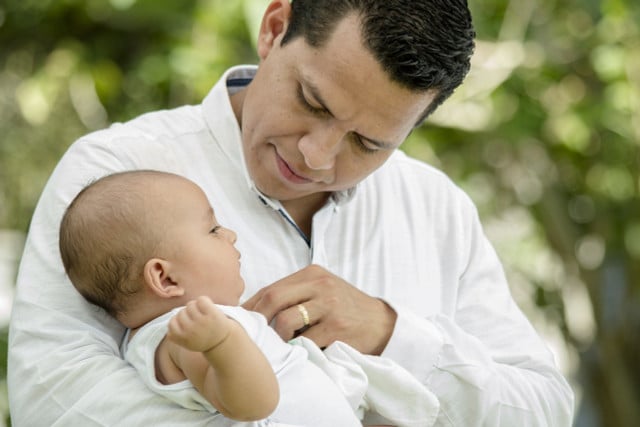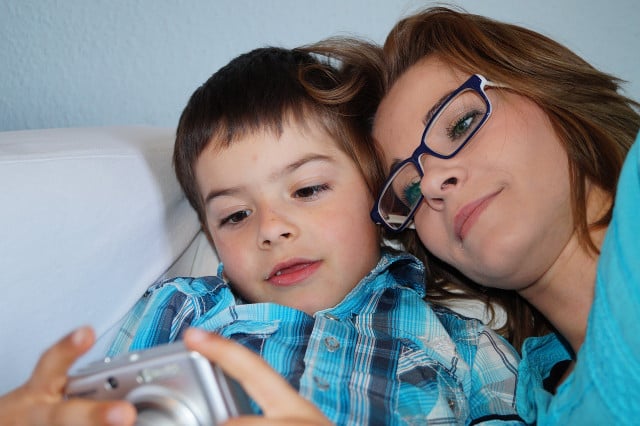If you want to be more patient with your kids and parent them in an empathetic way, mindful parenting could be for you. We’ll discuss its benefits, strategies to get there and give specific examples.
Mindfulness relates to parenting much more closely than you might think. To understand how mindful parenting works, we first need to learn the basics of mindfulness itself. Mindfulness has been a buzzword for the last few years, with health experts stressing its importance for our mental health, particularly since the start of the Covid-19 pandemic. But what exactly do we mean when we talk about those concepts?
What Is Mindful Parenting — and What Is Mindfulness?

What is mindfulness?
In a nutshell, mindfulness means being aware of and acknowledging your current thoughts and feelings, whether positive or negative. It is also about being aware of your surroundings, such as what you can see, hear, smell, or feel. Mindfulness encourages slowing down and not juggling too many things at once, or even monotasking.
What is mindful parenting?
Mindful parenting encompasses all these aims into the process of raising children. Experts agree that mindful parenting means being present in the moment, focusing on the issue at hand and not being judgmental when speaking to our children.
The main aim of mindful parenting is to take a moment to act in an effective and constructive way to our child’s behavior, instead of following our knee-jerk reaction. This means pausing and reflecting inwards on our child’s feelings, as well as our own. It also involves listening to our child’s needs with our full attention and patience, for example, your two-year-old is kicking off at the dinner table and you don’t know why. With a bit of probing and listening you discover it’s because they want the blue cup, not the red one.
Mindful parenting doesn’t mean “giving in” or spoiling our children, but responding to their needs and understanding what is important to them in their little worlds — yes, the blue cup really is that important.
This can teach parents how to take a step back when they think they are about to lose their temper and might even help avoid parental burnout.
You are or are the partner of a mother struggling to juggle the demands of parenting, work and life in general? Find out more about the mental load of motherhood and 5 ways partners can help.
Examples of Mindful Parenting
Example 1: Mindful parenting means staying in the moment and focusing on the present
As a parent of more than one child, you might sometimes find yourself comparing one sibling to another. Your eldest might have been able to ride a bicycle by age three, but your youngest is already three and still struggling to pedal and make the wheels go around.
Instead of saying “Your brother could ride a bicycle when he was your age”, mindful parenting involves being in the moment, so there is no relevance in comparing things to the past, it would therefore be more empathetic and kind to say something like “I’m really pleased with how hard you’re trying to ride your bicycle, keep trying and you’ll get there in the end. I’m here to help you along the way”.
As this example shows, mindful parenting involves not only seeing things from your perspective but also through your child’s eyes. This means reflecting on how they feel, by putting yourself in their (little) shoes, instead of getting angry with them for throwing a tantrum in the supermarket, we can delve into their mind and imagine why they’re feeling frustrated. Are they hungry? Did they miss a nap? Have you been running errands all day and they’re bored? Stopping and taking a moment to think can make the difference between bringing the child closer to you and pushing them away.
Example 2: Mindful parenting means not giving into emotional knee-jerk reactions
Or, imagine you’ve just spent an hour in the kitchen cooking a nutritious meal for the family, which your toddler turns his nose up to. Instead of getting angry and demanding he eat it, gently explain that he can’t have fries every day because they’re not good for him and you’ll be happy if he tries two spoonfuls of your meal. If he still refuses, calmly let him sit at the table while you finish your meal and remind him that he won’t be getting anything else tonight.
Chances are he’ll come back to the meal later when he’s hungry. Sounds easier said than done? This will be easier for you if you regularly do breathing exercises, try for example the 4-7-8 breathing technique.
Example 3: Mindful parenting means practicing empathy — even in stressful situations
As all parents know, if a child is having a tantrum, they don’t care about where they do it, so, imagine your kiddo is throwing a fit in the grocery store and you’re getting looks from other shoppers. Instead of dumping the groceries and storming out of the store or telling them off through gritted teeth, take a moment to think about their feelings and their day. Get to the root of the tantrum and practice empathy by reflecting on how the child is feeling.
Example 4: Mindful parenting can mean giving room to your own feelings
Mindful parenting can even be practiced in the newborn phase. Let’s say baby has woken up again for the hundredth time at night and your heavy head and heart feel a mix of despair, exhaustion and frustration, as well as guilt for feeling negative about your little one. Acknowledge how you feel and take a moment to let the feelings wash over you before attending to baby’s needs. Remember that one day, they will sleep better.
Comparison Between Mindful Parenting and Gentle Parenting



Have you heard about being empathetic in parenting before? You may well have read about empathy in parenting in our guide to gentle parenting. There are quite a few similarities between mindful and gentle parenting, let’s take a look at them.
What they both aim for
Mindful parenting and gentle parenting both require expressing empathy to the child and thinking about how they feel. Both techniques involve listening to the child’s needs, being aware of their emotions and showing compassion.
They also involve an element of self-regulation to avoid reacting negatively too quickly to a child’s behavior — we can control our reaction to things, even if we can’t always control the situation itself. This mindset is similar to stoicism — you can learn more about how to be a stoic and manage stress in our guide on the topic. The result of both mindful and gentle parenting means a child who learns to label their emotions and become more empathetic.
What they both avoid
Both methods do not use traditional methods of discipline such as “time outs” and they avoid naming children as “naughty”. Rather, they teach that outbursts are teachable moments for both parent and child and the child’s emotions need to be nurtured through empathy, patience and mindfulness.
Differences
The major differences are reflected in the respective names:
In gentle parenting, there is stronger emphasis on avoiding punitive measures and discipline techniques and the aims to raise children in a non-coercive environment. While gentle parenting may acknowledge the benefits of mindfulness, it does not necessarily require parents to engage in formal mindfulness practices as a core aspect of the approach.
Mindful parenting, on the other hand, centers around being fully present and engaged in the parenting journey, with a focus on self-awareness and emotional regulation. Mindful parenting encourages parents to be attentive to both their own and their child’s needs, and therefore requires more self-introspection from the parent. Avoiding punitive measures is less important than in gentle parenting. Instead, it places more emphasis on the parent’s self-regulation and emotional awareness in order to model appropriate behavior to the child.
Benefits of Mindful Parenting



There are multiple benefits to mindful parenting, for both parent and child.
- Stress reduction — Mindful parenting could have benefits for other aspects of your life, for example by reducing overall stress levels and teaching you how to avoid reacting too quickly to stressful situations. After all, mindfulness-based stress reduction is one of the most popular and effective forms of dealing with and reducing stress.
- Improving parent-child relationships — Engaging with your child’s feelings and emotions can encourage them to open up to you and trust you. This is important beyond the early years and can continue into the teenage years when children find themselves going through other difficulties.
- Encourages emotional regulation — Mindful parenting helps you to regulate your emotions by pausing and taking a moment to be in the moment before reacting. It also encourages children to learn about and recognize their own emotions, as mentioned in a 2009 study. This way, children learn to express themselves and communicate better, which in turn can help reduce the amount of negative behavior.
- Improves parenting satisfaction — Mindful parenting reduces negative feelings about parenting from yelling or punishing our kids to working on having a closer relationship with them.
- Improves children’s well-being — Mindful parenting can reduce feelings of depression and aggression in children, as well as anxiety and stress.
Mindful Parenting Strategies



How can we practice mindful parenting? Here are some tips to get started and some real-life examples:
- Meditate — Being mindful involves engaging with your senses and being aware of what’s around you. This is similar to parts of meditation, where you engage with your environment in order to relax and focus on breathing, metta meditation for forgiveness and self-love can be done for just a few minutes a day.
- Feel — As mentioned above, mindful parenting involves feeling what’s around you, this includes the other senses, so make sure you listen carefully, open your eyes and even smell the moment.
- Take a deep breath — Before you can overreact, pause and take a deep breath to give yourself a moment to calm down. Learn more about conscious breathing, which can reduce stress and increase focus. Reduce stress in your life by making time to connect with friends and your partner, this will improve your overall happiness and make it easier to be patient when parenting.
- Live in the now — Don’t dwell on what you wish your child would behave like, but focus on who they are now and how your guidance can help them become a great adult. Another way to live in the now is to focus on self-care and regularly allow yourself to recharge, in order to feel energized enough to carry out mindful parenting, try these 15 ideas for mindful relaxation.
- Embrace emotions — Let your emotions wash over you and just let them be, taking a moment to do this will stop your knee-jerk reaction to negative emotions.
- Know your triggers — Being mindful of what elements of your child’s behavior make you snap can help you first, to pause before reacting, but also think about how that behavior can be prevented. For example, if you always snap at your kids when you’re busy cooking after school and they keep asking for something, think about whether you can avoid cooking long meals when your child needs you. Maybe cook up a big batch of dishes (with the kids’ “help”) on Sunday evenings and freeze them, or get little one to have a hot meal at school, so that you can offer them a lighter meal at home and spend more quality time together.
- Admit wrongdoings — Part of mindful parenting is to admit our mistakes, not only to ourselves but to our children. So, for instance, if you found yourself yelling at your child as in the above example, when you were busy cooking dinner, make sure you apologize for it. It doesn’t have to be right away, but showing your child that you know that you hurt their feelings and that their feelings are important to you can help boost confidence. It’s also humbling to see how forgiving kids are, ensure that your apology is sincere and learn how to apologize the right way.
Limitations of Mindful Parenting



In truth, mindful parenting is not easy and will not be suitable for everyone. Perhaps the first point to bear in mind is: do you have time for mindful parenting? Mindful parenting involves teaching yourself to avoid negative parenting habits and these may be difficult for you to change at first and will take time to adapt to.
It might lead some to set unrealistic expectations: Striving for constant mindfulness can create unrealistic expectations for parents, leading to feelings of guilt or inadequacy when they are unable to maintain mindfulness in every moment.
Another important point to bear in mind is the cultural background of parents and children: Mindful parenting techniques may not align with cultural norms or expectations, and parents from diverse backgrounds may need to adapt the approach to fit their specific cultural context.
Important to remember: in certain situations, mindful parenting won’t be appropriate — for example, if your child is in danger, yelling at them, or physically moving them may be the quickest way to keep them safe.
Lastly, ensure that your partner is on the same page, as if they lean towards authoritative parenting, the mix of the two won’t work and will confuse the child.
Read more:
- 8 Tips to Overcome Imposter Syndrome & Unlock Creativity
- Unlock Intellectual Humility: Uncovering Its Benefits, Obstacles, and Development
- What Is Anti-Natalism? The Ethical and Ecological Motivations
Do you like this post?







